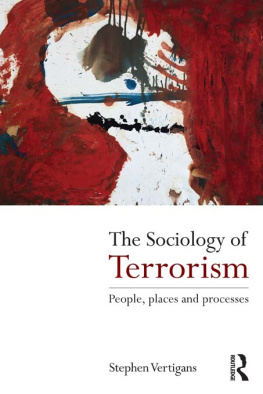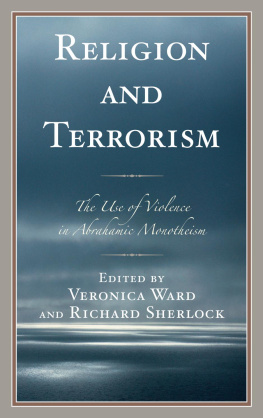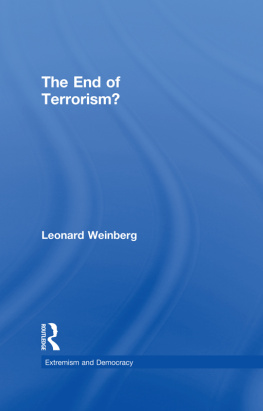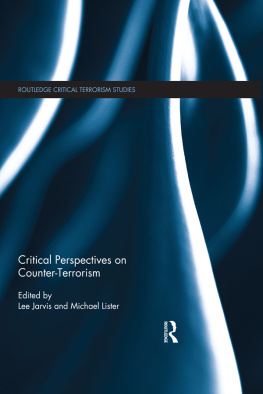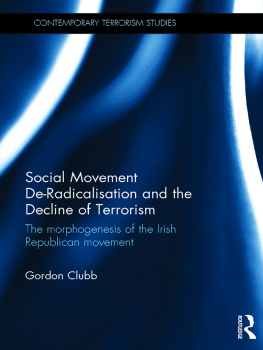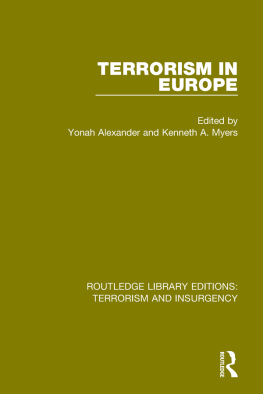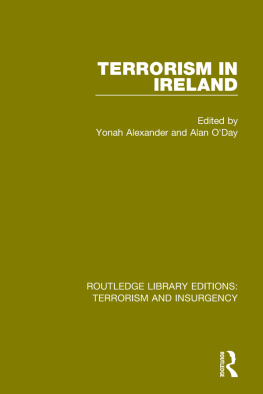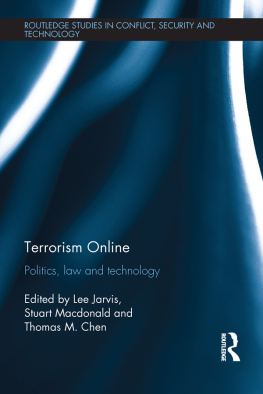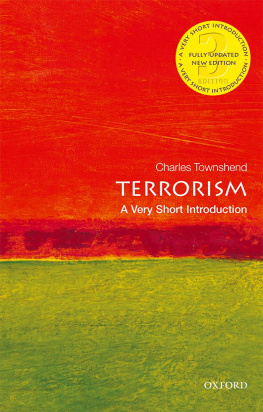The Sociology of Terrorism
This is the first terrorism textbook based on sociological research. It adopts an innovative framework that draws together historical and modern and local and global processes for a range of individuals, groups and societies. Individual behaviour and dispositions are embedded within these broader relationships and activities, allowing a more holistic account of terrorism to emerge. In addition, the shifting forms of identification and interwoven attitudes to political violence are discussed in order to explain the emergence, continuation and end of terrorist careers.
The book draws on examples from across the discursive spectrum, including religious, red and black racialist, nationalist and trans-national. It also spans territories as diverse as Chechnya, Germany, Italy, Japan, Northern Ireland, Pakistan, Palestine, Saudi Arabia, South America, the UK and the US.
Stephen Vertigans is Professor of Sociology in the School of Applied Social Studies, Robert Gordon University, Scotland. He has published widely on terrorism and related militant groups, with recent books including Militant Islam: A Sociology of Characteristics, Causes and Consequences (2009) and Terrorism and Societies (2008).
The Sociology of Terrorism
Peoples, places and processes
Stephen Vertigans
First published 2011
by Routledge
2 Park Square, Milton Park, Abingdon, Oxon, OX14 4RN
Simultaneously published in the USA and Canada
by Routledge
711 Third Avenue, New York, NY 10017
Routledge is an imprint of the Taylor & Francis Group, an informa business
2011 Stephen Vertigans
The right of Stephen Vertigans to be identified as author of this work has been asserted by him in accordance with the Copyright, Designs and Patent Act 1988.
All rights reserved. No part of this book may be reprinted or reproduced or utilised in any form or by any electronic, mechanical, or other means, now known or hereafter invented, including photocopying and recording, or in any information storage or retrieval system, without permission in writing from the publishers.
Trademark notice: Product or corporate names may be trademarks or registered trademarks, and are used only for identification and explanation without intent to infringe.
British Library Cataloguing-in-Publication Data
A catalogue record for this book is available from the British Library
Library of Congress Cataloging in Publication Data
Vertigans, Stephen.
The sociology of terrorism : peoples, places and processes / by Stephen Vertigans.
p. cm.
Includes bibliographical references.
1. Terrorism--Social aspects. 2. Terrorism--Psychological aspects. I. Title.
HV6431.V469 2011
303.625--dc22
2010052907
ISBN: 978-0-415-57265-1 hbk
ISBN: 978-0-415-57266-8 pbk
ISBN: 978-0-203-85581-2 ebk
Typeset in Times
by Taylor & Francis Books
Contents
Acknowledgements
There are a number of people who have been instrumental in the development of this book who I would like to thank.
At Routledge the support and encouragement from Gerhard Boomgaarden and Jennifer Dodd has been both considered and considerate. It has been a pleasure working with them. The ideas within this book have evolved over time and I am grateful to all those who have contributed to the process whether at conferences or university seminars. Stephen Mennell, Phil Sutton, Chris Thorpe, Megan Todd, Val Vertigans and Cas Wouters have provided illuminating comments on some, or all, of the contents and I am extremely grateful for their efforts. As ever both mistakes and royalties are mine. Finally throughout my time at the Robert Gordon University I have been encouraged and supported by Joyce Lishman. Her constructive management will be sorely missed.
Introduction
The absent friend: Sociology, missing from
action
Today terrorism and counter-terrorism are amongst the most divisive issues facing many contemporary societies. Perhaps unsurprisingly the interrelated topics have become a burgeoning area of academic study. Post September 2001 there was an impressive and rapid increase in the publication of books and papers that has to some extent been maintained. Based upon the quantity of publications it could be anticipated that levels of knowledge and understanding about the subject matter have been significantly enhanced. To some extent this is true. Important contributions have been made within political science, international relations, security studies, psychology and to a lesser extent economics. Typologies, power, economic exclusion, political (non) participation, defence and individual factors have become embedded within perceptions about the causes and consequences of terrorism. Yet stereotypes continue to pervade popular perceptions that feed upon, and are fed by, sensationalised media images and self-serving political portrayals. That these impressions often connect with prevailing opinion about other ethnic groups or religions, including, most notably at present, Islam, is considered evidence to support reinforced and inflated demonisation of associated groups and individuals. In the case of groups associated with al-Qa'ida, as Milton-Edwards (2006) commented, religion becomes the explanation, and the multitude of factors which contribute to people becoming violent in the name of Islam are neglected.
By comparison, little or no attention has been allocated to understanding the origins of these impressions and the ways in which they may interact with subsequent experiences within processes that result in the formulation of terror groups. Instead clichs dominate which fail to acknowledge that terrorists originate from across the world, in different societies that often have a history of political violence, with a multitude of socio-economic experiences, varying levels of qualifications and resources and include male and female attackers of different ages. There are a number of reasons why such caricatures continue to pervade. One of the main factors I shall argue in this book is that although sociology has the concepts and theoretical tools to enhance deep rooted levels of knowledge and understanding, the discipline's contributions are severely restricted. Hence, this needs to be addressed. Sociological insights should be positioned within studies of terrorism to help push the boundaries beyond the media friendly images of pantomime villains, Hollywood styled attacks and heart wrenching victims.
Therefore this book seeks to contribute towards the implementation of sociological perspectives into terrorism. I should stress at this point that this is not an exhaustive exploration of either sociology or terrorism. The sociological novice will not be hugely disadvantaged because concepts and theories are explained and only applied in a manner that is designed to help to understand the processes in and out of terrorism. Nor is this the book for detailed examination of sociological contributions. Instead I intend to restrict sociology to the spheres in which sociological thinking can help enhance insights that are currently lacking. Hence sociology and terrorism become interwoven but in a discrete manner that will not deter readers from other disciplines or with broader interests. Indeed, this is not even an exclusively sociological approach. My primary aim is to examine the social processes and to do so will require the incorporation of contributions from psychology, political science, anthropology and economics to name but a few relevant disciplines. Although the book is explicitly underpinned by sociological ways of thinking, disciplinary rivalries and jealousies will be put aside, if only temporarily, when contributions from other disciplines compliment and supplement. Similarly I am not assuming that readers will have a detailed grasp of terrorism, and the glossary is designed to provide sufficient information about groups in order to make the sociological applications meaningful. Although it is not necessary to be interested in sociology in order to hopefully find this book of value, it probably is necessary to be interested in terrorism. If you are not now may be a good place to stop reading.

